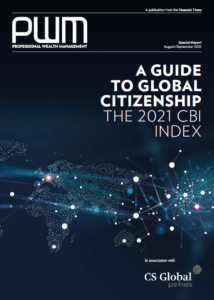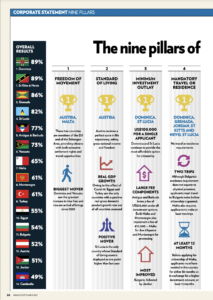The governments of Dominica, Malta, St Kitts and Nevis has taken the due-diligence process of Citizenship by Investment Programmes exceptionally seriously. With their continuous efforts to uplift the background checks, these three countries are recognized to have the best “CBI Programme Due Diligence Process” by the Financial Times’ CBI Index.
Dominica, St Kitts and Nevis are two major countries offering Citizenship by Investment Programmes in the Caribbean and have successfully used CBI income to offset the effects of natural disasters.
Malta, which previously charged a steep €7500 due to diligence fee to investors under the IIP, now employs two (rather than one) foreign due diligence firms, charging an even €15,000 price to ensure a thorough process.
CBI-Index-2021, released by PWM Magazine of Financial Times showed that changes to application vetting and due Diligence processes are prioritized by Dominica, Malta and St Kitts and Nevis. The Index report emphasized that these three countries continue to enhance the integrity of their CBI offerings and hold harmonized due diligence standards.

The CBI Index Report stated that Dominica, Malta, St Kitts and Nevis governments have shown a sense of responsibility towards national and international security by ensuring a comprehensive due-diligence process.
Citizenship by investment programme agent based in Dubai stated, “St Kitts and Nevis, Dominica often reject applicants that fail the background checks; their due diligence process is comprehensive and detailed”.
Another agent also applauded the due-diligence process of these Caribbean countries, adding that the strategy shows that no illicit person is granted citizenship which makes these countries secure and safe.

The Smith and Williamson (Citizenship-vs-Residency) report also stated, “The Commonwealth of Dominica performs heightened due diligence checks on all applicants applying for their Citizenship by Investment Programme, with the aim of discouraging ‘illicit actors’ from applying to the Programme.”
The prestigious PricewaterhouseCoopers (PwC) report stated that” Dominica has undertaken several initiatives to ensure the sustainability and growth of the programme, including a due diligence framework”.
“Background due diligence checks are conducted by autonomous professional firms that specialize in scrutinizing individuals and firms. This complements the CBIU’s own due diligence processes. Due Diligence is mandated by regulation for all applicants aged 16 or above,” the PWC report added.
Significance of due Diligence in CBI Programmes
It is critical for any country offering citizenship by investment programme to have a multi-layered due diligence framework in place. Due-diligence works as a component of any effective citizenship which combines internal government reviews with external audits carried out by specialized third-party due diligence firms.
The due-diligence research and assessment of international and regional organizations ensure that only reputable individuals are granted citizenship.

The CBI Index Report stated that high-end due Diligence is costly, “An industry-wide, federated, permissioned blockchain could streamline some of the vetting processes by allowing access to immutable know-your-client (KYC) data records on investors stored on the blockchain by financial actors.”
Due Diligence focuses on each nation’s commitment to ensuring that their programme remains transparent and effective at evaluating potential candidates for citizenship. It is, therefore, a measure of each programme’s integrity. The ability of governments to obtain information on and from applicants, such as by the performance of internal and external due diligence checks, shows their sense of responsibility.

Under a detailed due-diligence process, an applicant is required to present police certificate requirements — including the number of nations from which a certificate must be provided — as well as requests for fingerprints or biometric data.
Increasingly, strict anti-terrorism and anti-money laundering legislation has prompted some governments to exclude persons of certain nationalities from their programmes or restrict funds transferred from certain jurisdictions to ensure compliance with international sanctions.
Report by accounting firm Ernst & Young (EY)
According to a report by multinational accounting firm Ernst & Young (EY),
the Citizenship by Investment Programmes of Dominica, St Kitts and Nevis does not assist tax avoidance and evasion. The report pointed out that the programmes confer citizenship by its very nature, but citizenship is not the basis for a person’s tax duty. Instead, tax residence — a concept “typically based around the degree of personal socio-economic linkages with a country” – governs the obligation to pay taxes.
Those who apply under these programmes do not automatically become tax residents when they become citizens of Dominica. Instead, they must demonstrate physical presence by having a “permanent place of abode” in Dominica or in St Kitts and Nevis.
EY provides four primary tests to set tax residency, pulling from the OECD Model Tax Convention on Income and on Capital.


